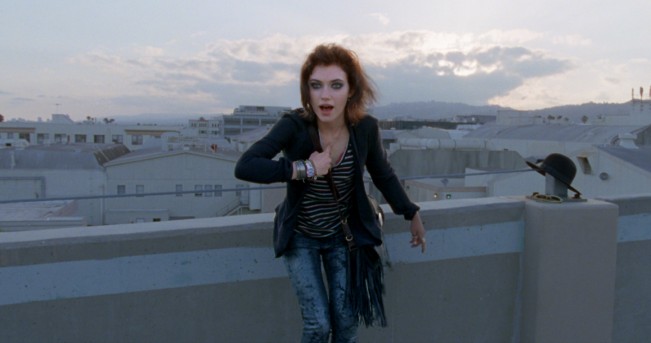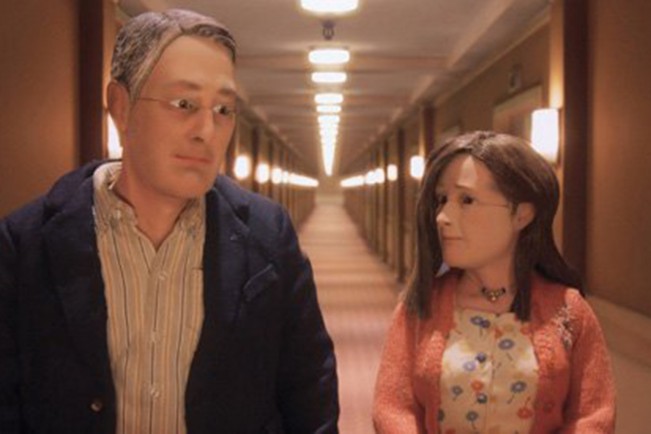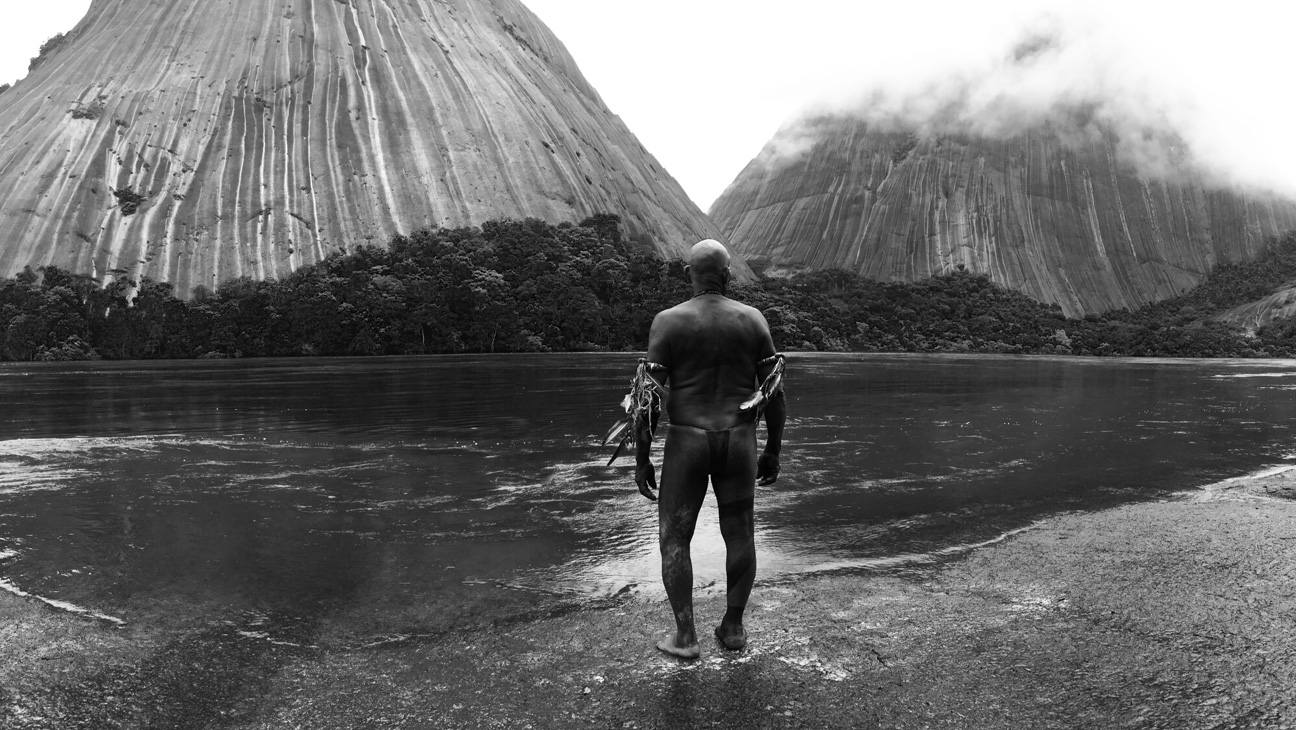By Ray Pride Pride@moviecitynews.com
Pride, Unprejudiced: Knight Of Cups, Anomalisa, Embrace Of The Serpent
THE KNIGHT OF CUPS (Broad Green, $30 Blu)
GUILT AS GOSSAMER, MEMORY AS WRAITH, WOMAN AS OTHER, love as labor lost: Terrence Malick’s seventh released feature, Knight of Cups, years in the shaping, is dense yet featherlight, elusive yet specific, a wonderment comprising one once-worldly man’s memories, the tide of a single life pummeled by remorseless undertow.
Malick’s murmurous, susurrant, sea and tear-soaked night dream by flat Los Angeles daylight glides alongside Rick (Christian Bale), a man steeped in loss, needful in love, aswirl in lissome seraphim, the lost souls of his longing. A man in crisis. Rick is a sought-after comedy screenwriter who hasn’t a laugh to his name, even as he trails after joy (women he’s known) or diversions in clubs and parties, blissed-out without bliss, in zone after zone of emptiness. Is he drugged, spent, abandoned, abandoning? Itching-scratching-tickling-howling beneath the surface? Knight of Cups is as sure and swift a depiction of unbidden memory you could hope to find: gentle, ever in motion, all-wounding. The form is of a piece with Malick’s most recent narration-swaddled work, The Tree of Life and To The Wonder, but its slipstream through slivered episodes of memory is fervent, strange and the most finished of this current brood. With ever-more free-associational editing, Knight of Cups’ camerawork provides a gliding vocabulary of rhythm, Emmanuel Lubezki’s widescreen, wide-angle frames deliquescing from moment to moment and memory to memory. Some early reviewers say it’s shallow and chichi; even without delving into Malick’s invocations of tarot and John Bunyan’s “Pilgrim’s Progress,” Knight embraces diverse ventures and captures la-la L.A. louche and without that seemingly familiar glimpse the film’s only layer.
The mesmerizing formal complexity, the density of montage, impresses more than the opening narration from a Gnostic text could lead you to expect: “Once there was a young prince whose father, the king of the East, sent him down into Egypt to find a pearl. But when the prince arrived, the people poured him a cup. Drinking it, he forgot he was the son of a king, forgot about the pearl and fell into a deep sleep.” Parable slips away in the face of so much moment in recollection. We are plunged into a fleet, sleek, unending now of regret, recrimination, regress. The insurgent ecstasies of two pieces of music recur: Wojciech Kilar’s “Exodus” and Vaughan Williams’ “Tallis Fantasia,” along with an original score by Hanan Townsend that stitches seams throughout the 119-minute mosaic of flayed emotion.
“I dreamt we were caught in a huge tidal wave that engulfed the entire city,” one of these half-dozen women from his past, always in motion, fingertips to the wind, tells him, dances away on tipped toes. “Is this a friendship we have? I don’ant to wreak havoc in men’s lives anymore.” She barefoots along the edge of a riser in front of a studio’s backdrop painting of bluest sky, as on the Paramount lot, even back to 1970s days when young screenwriter Malick walked there at the crest of the Hollywood Renaissance that allowed him to make Badlands and Days of Heaven. Now they’re at the edge of a roof of a parking garage, she states in voiceover, plainly pleased, “I see how you look at me. You think I could make you crazy. Crack you out of your shell. Make you suffer.” Present tense: She pokes a finger. “I. Think. You’re. Weak.” Her voiceover takes back the world: “You don’t want love. You want a love experience.” She turns to him as if at the end of, yes, Rilke’s “Archaic Torso of Apollo,” “Am I bringing you back to life?” If anything of what she says is a question, Rick has answers for none of it.
Dreamer wanders, wonders of misplaced love. And then there’s the crumpled male lineage also seen in Tree and Wonder. An impulsive brother, lost (Wes Bentley). Another, passed. A cruel, commanding father (Brian Dennehy). All that is sensual melts into larger sensation. In a vivid Vegas interlude, Rick meets a drawling young pole dancer, who holds her face up to his on first encounter, tells him, “You live in a little fantasy world, don’t you? Yes? Because it’s so much more fun.” The club’s reflecting blue neon is coolly hellish. “You can be a saint, you can be a cop,” she continues.
His own thoughts are less than engaged in the real world, outside his mind, with doctor ex-wife Nancy (Cate Blanchett), married mistress Elizabeth (Natalie Portman), dancer Isabel (Isabel Lucas), model Helen (Freida Pinto) and punkishly, puckishly provocative Della (Imogen Poots), each of whom hope, without much hope at all, to connect with Rick. Malick shuffles tableaux of physical presence, that Malick twirl of female figure, palms and fingers drifting rather than lacing. A kaleidoscopic collage of sensation, fragrant with regret, the physical just lingering, elusive, even at fingertips’ edge. And water, water, everywhere, wellsprings of water, currents, the ocean in search of shore and tickling at the toes of its supplicants, sloshing swimming pools, drip-drip-drip from bathtub faucets, even in an ice sculpture at a mansion party freed of its blocky form and shattered into brilliant shivers lit by Lubezki’s ever-living golden hour. And Rick can only think thoughts like, “Thirty years not living life, but ruining it. For myself. And for others. I can’t remember the man I wanted to be.”
There are more glimpses of nudity and flashes of eroticism than in almost all Malick’s earlier films combined. There’s a striking moment when mistress Portman, barelegged, slinks toward him in one of the succession of clean, impossibly airy interiors Rick has occupied. She extends a leg and flexes her crooked, long, dancer’s toes into Rick’s supplicating mouth, a challenge he meets but does not exceed. Nothing fails like acquiescence. Rick is taken, but he does not—cannot?—give. It’s weirdly emblematic. What wisdom has Rick? Reflections ricochet in his mind like, “You think when you reach a certain age, things will start making sense, but you find you are just as lost as before. I guess that’s what damnation is.” Horror. Beauty. Houses of memory, successive sensations in recollection. Gorgeous and singular, Knight of Cups is a vision. A terrifying one, sometimes rapturous, but tactile with fierce, lingering melancholy, an emulation of the cruel patterning of the brooding mind, that could only be achieved by Malick’s elongated shooting and editing process. Time regained is no salvation.
ANOMALISA (Paramount, $40 Blu-DVD-Digital)
MICHAEL IS A WEARY MIDDLE-AGED MAN, a motivation expert who flies overnight to Cincinnati to address a convention of customer service reps, where the attendees know him for his most recent book, “How May I Help You Help Them?” Charged moments come from the seemingly commonplace: A perfunctory call to his wife back in Los Angeles, an impulsive call to an ex and an ill-advised drink, meeting a sweet, younger, seemingly uncomplicated younger woman, a baked-goods customer-service rep named Lisa (a tenderly winsome Jennifer Jason Leigh) who’s admired him from afar. Simple, except that Anomalisa is stop-motion animation, turned to the very adult means of fleshing out a screenplay by Charlie Kaufman that began as a staged “radio play” for three voices. The combination of simplicity and intricacy make the strange, thrilling Anomalisa discernibly a Charlie Kaufman object, as diamond-dense as his directorial debut, Synecdoche, New York was sprawling. Here’s part of an interview with Kaufman and animator Duke Johnson.
Kaufman: What’s interesting about animation is that everything is choreographed, everything is calculated. There’s more or less no accidents. The other side of that is that the sound is the same principle. There’s no naturally occurring sound. Everything is added afterwards. Everything is a choice. Everything in the way that the characters move is a choice, everything in the sound that you hear, applied to each movement is a choice. I never really articulated that before, but it really is this sort of woven-together artifice, visually and aurally.
There are no happy accidents.
Everything is decided, yeah, yeah. I think there are happy accidents in the voice records, but not after.
What draws you to contention, to these pitched, disputatious moments between characters? They’re shot from different guns, but they’re still deadly weapons. Do you get joy from writing so specifically about verbally how we hurt each other?
I don’t know. I don’t know if I get joy from writing much at all. Occasionally I do, if I do something I like, “Aw that’s good,” I think. Usually it’s just sort of a struggle. And I don’t get particular joy in writing anything that’s people hurting each other.
Then we have the tender and true and clumsy sex scene. It’s two humans trying.
Yeah. Yeah, that’s what we were going for. We didn’t want it to be a joke. Which it could easily have been. And I think the expectation is that it was going to be. People expect that, oh it’s puppets having sex, it’s going to be a joke. But we really worked hard to make it not a joke. [laughs] It’s unflinching. Six months of animation for that scene! [More of the interview here.]
EMBRACE OF THE SERPENT (Oscilloscope, $40)
Ciro Guerra’s hypnotic twentieth century-set Embrace of the Serpent (El abrazo de la serpiente), a Colombian-Venezuelan-Argentine co-production, spoken in nine languages and Colombia’s entry for 2015’s Best Foreign Language Oscar, is an otherworldly-innerworldly trip, a serenely strange vision of black-and-white iridescence, a journey, at first, toward healing, but also toward foreseeable predations of colonialism. Yet lessons lie low as the confident illogic of raging visions takes hold.
Guerra’s lyrical, fairytale-simple third feature pulses with Herzogian ambition, as demonstrated in movies like Fitzcarraldo and Aguirre, The Wrath Of God (as well as its lulling, gentle patches, which exist also in most Herzog), as well as toward more hallucinatory meet-the-indigenous narratives, including Jim Jarmusch’s dream of the walking dead, Dead Man, and in its more emphatic, expressionistic bursts, the pungent work of Alejandro Jodorowsky. There are at least three passages of ungenteel visions, big-screen phantasms that break free of the ironically twinned primary narratives. Nor would it be wrong to invoke the fated, weighted journey upriver in Apocalypse Now or the manifestations of religious madness from Ken Russell’s The Devils. Guerra even dares comparison to a key, late scene from 2001: A Space Odyssey. Yet the work seems Guerra’s own, freshly dreamt, rather than simply cinephilically steeped. (The sublime, silvery Super 35 images, as well as the setting, also evoke the body of work of the great Brazilian documentary photographer Sebastião Salgado.)
Drawing on the journals of Theodor Koch-Grunberg and Richard Evans Schultes, explorers of the Colombian Amazon, Embrace begins in the 1900s with the German Koch-Grunberg (Jan Bijvoet) in search of a rare, mysterious flower, the sacred plant yakruna, that he believes can cure him. They meet Karamakate (the Cohiuanon tribesman Nilbio Torres), an Amazonian shaman who believes he is the last of his kind. A second narrative, set in 1940 after the incursion of predatory rubber barons, is interleaved, taking the older Karamakate (Antonio Bolívar) on another, darker journey, with another explorer, Schultes (Brionne Davis), in quest of the elusive yakruna. Both quests move deeply, darkly toward hearts of darkness.
Telling a fable, “It’s a dream, you must follow it,” the older Karamakate says. “I am a man of science, of real, palpable facts,” the 1940 explorer replies. “I can’t be guided by dreams I don’t have.” “Yes, you are,” Karamakate replies, asking him how many edges does the river have. The man of science insists, two, and Karamakate says, “This river has three, five, a thousand edges. A child can understand that easily, but not you. The river’s the anaconda’s son. We learn that in our dreams, but it’s the real truth, more real than what you call reality.” In the respectful deadpan between the two men, the notion soars higher than diction that could arrive at New Age cant. Karamakate snatches a man away, crumples it, tosses it to the water, widens his arms. “The world is like this, huge. But you choose to see just this. The world speaks. I can only listen. Hear the song of your ancestors.”
The landscape is elemental: river’s flow, surface a watery sheath; idal surge; ocean current; horizons-vast, unspoilt jungle seen from the perspective of a careening bird; rifle’s crack, layered sounds of unknowable expanses of jungle with upraised, undiscovered animal voices; the sure hit of hallucinogens; misguided messianic violence: Guerra’s silken surfaces and sudden eruptions seduce the eye and ear in equal measure.


















